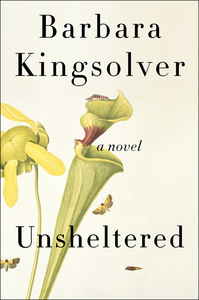

A new novel by Barbara Kingsolver is always eagerly anticipated by the readers of literary fiction. “Unsheltered†has just been released, and it is an important work that dramatizes many of the existential threats facing Americans and the world today.
When Kingsolver was conceiving and writing the novel, Donald Trump was running for president, and his ascendancy only magnified what was becoming apparent, that many of the “shelters†of the past were collapsing, whether political, economic or religious. Can we survive “unsheltered?†That is the central question in the work.
In order to tell her story, Kingsolver tried to find another period in American and world history in which old certainties were being questioned, and it seemed as if the world handed down from the past was being destroyed. She appropriately came up with the 1870s when the theories of Charles Darwin were calling into question the very basis of what it means to be a human being.
In a strategy that is rare in Kingsolver’s work, she sought out a real person to form the basis of the historic section of the novel. She found an American scientist in Vineland, New Jersey, Mary Treat, who was a correspondent with Charles Darwin for many years. She researched Treat’s life and her writings and then began creating a novel from there.
In this section of the novel, the central character is Thatcher Greenwood, a science teacher in Vineland, who lives next door to Mary Treat. He gets in trouble with the local community by daring to introduce even elementary Darwinian theories into his classes. He finds sustenance in his developing friendship with Treat. When Greenwood laments to her that “I’m afraid I foresee a great burrowing back toward our old supremacies,†Treat responds, “Without shelter, we stand in daylight.â€
The main characters in the contemporary story are Willa Knox and Iano Tavoularis, who live at the same address in Vineland, New Jersey, as Greenwood. Their lives seem to be falling apart, and their dilapidated house is falling down around them. Iano’s liberal arts college in Virginia has closed, he has lost his tenure and pension, and the family has moved north to live in a house they have inherited and to be close to a new temporary teaching job that Iano has found. Willa worked for a magazine that has been forced to close. Iano’s dying father is living with them. Their adult children have moved back in with them as well, the son Zeke with a newborn baby whose mother has committed suicide, a daughter Tig returning from living in Cuba.
What links the two stories is Willa’s search for the history of their house, so she can apply for historical restoration funding to repair the house. She discovers Mary Treat and becomes fascinated by her. “Unsheltered†artfully develops these two stories in alternating chapters, with the last phrase of each chapter being the title of the next. The last phrase of the book, “Falling House,†even circles back to be the title of the first chapter.
Can we live “unsheltered†and “stand in daylightâ€? Kingsolver dramatizes the agonizing struggle that the world is going through currently to see if human beings can survive into the future. As the daughter Tig, the representative of the next generation, observes, “All the rules have changed and it’s hard to watch people keep carrying on just the same, like it’s business as usual.â€
Ultimately, the poet Wallace Stevens in the epigraph is foretelling the wisdom of the book: â€After the final no there comes a yes/ And on that yes the future world depends.†“Unsheltered†is an important book, this fall’s “must read†around the world.
Ben Jennings retired recently from Virginia Highlands Community College where he taught English and film courses. He has been a member of the A! Magazine Committee for 25 years.
READ ON
Bellwether prize given to books with courageous themes